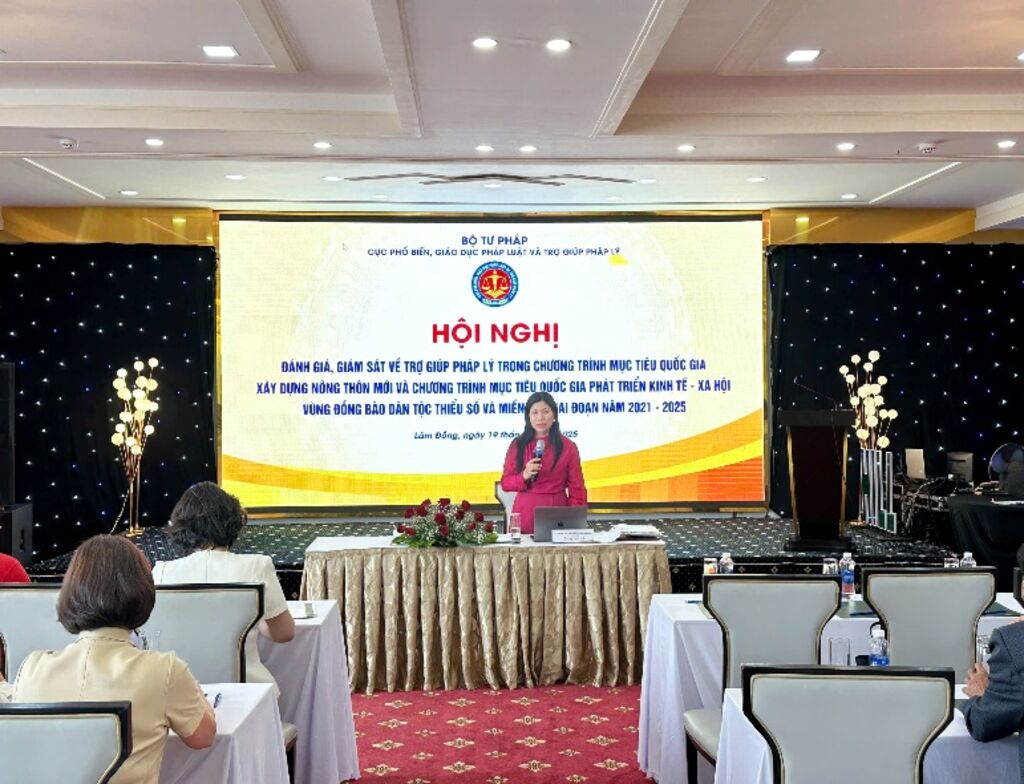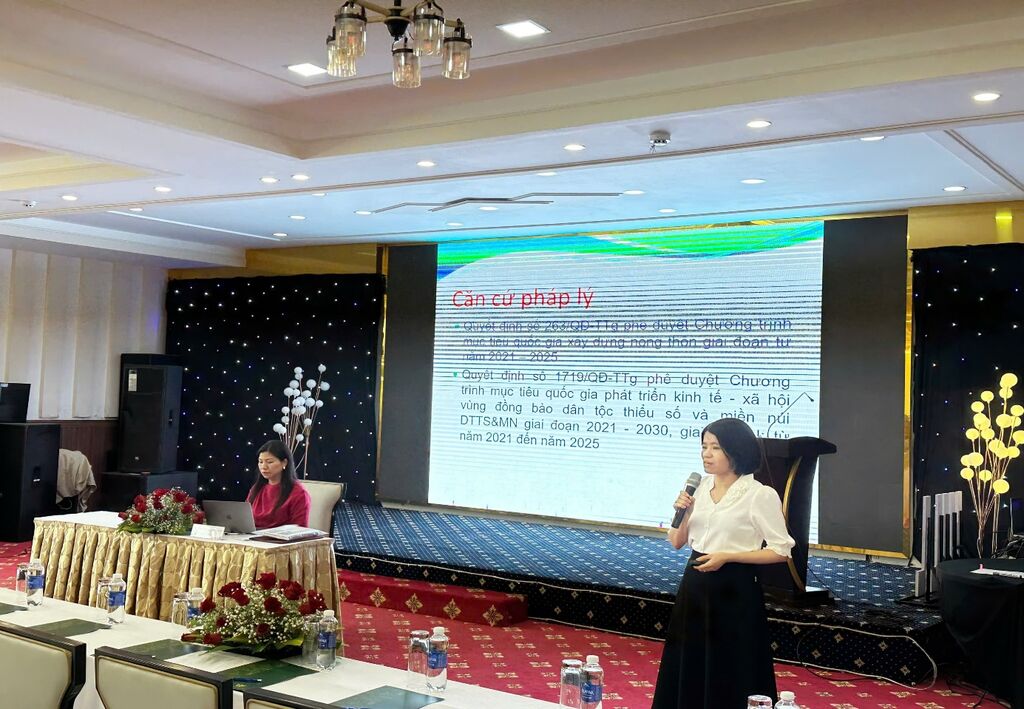 |
| To Thi Thu Ha, Deputy Director of the Department of Law Dissemination and Education and Legal Aid, the Ministry of Justice, chairs the event__Photo: Department of Law Dissemination and Education and Legal Aid |
On September 19, the Department of Law Dissemination and Education and Legal Aid under the Ministry of Justice convened a conference in Lam Dong province to review and supervise the implementation of legal aid activities under two major national target programs: the program on socio-economic development in ethnic minority and mountainous areas, and the program on building a new-style countryside for the 2021-2025 period.
Chaired by Deputy Director To Thi Thu Ha, the event provided a forum to assess results, identify shortcomings, and propose solutions to improve the delivery of legal
Growing public awareness about the right to legal aid
In her opening remarks, Deputy Director Ha stressed that legal aid has been formally integrated into national target programs, confirming its role within the social security framework. This inclusion enables disadvantaged groups, including the poor and ethnic minorities, to access free legal services when facing disputes or legal obstacles.
She noted that many successful legal aid cases have helped safeguard the legitimate rights and interests of beneficiaries. With 2025 marking both the final year of the national target programs of the current period (2021-2025) and the transitional year for designing new programs for the next phase (2026-2031), the conference was seen as a timely opportunity to review progress and challenges.
Ha also highlighted key policy directions, including Resolution 27-NQ/TW dated November 9, 2022, of the Politburo on building and perfecting the socialist rule-of-law state, which calls for enhancing the professionalism and quality of legal aid, especially in judicial proceedings, modernizing the system through information technology, and expanding the scope of beneficiaries; Notice 108/TB-VPTW issued on November 18, 2024, after Party General Secretary To Lam’s working session with the Party Committee of the Ministry of Justice, which reaffirms the importance of legal aid in implementing social security policies; and Resolution 66-NQ/TW of April 30, 2025, of the Politburo on renewing lawmaking and law enforcement, which emphasizes vigorously promoting legal services, legal support, and legal aid to help citizens and businesses better access the law and manage legal risks.
With this guidance, the conference was expected to gather opinions to refine the legal aid component within national programs, ensuring both practical relevance and alignment with the Party’s directions.
 |
| Le Thi Thuy, Director of the Center for Legal Information and Support under the Department of Law Dissemination and Education and Legal Aid at the event__Photo: Department of Law Dissemination and Education and Legal Aid |
Steady growth in legal aid cases
Delivering a report, Le Thi Thuy, Director of the Center for Legal Information and Support under the Department, said legal aid activities have been implemented consistently from central to local levels, leading to higher public awareness of the right to legal aid. More people are proactively turning to legal aid centers for assistance.
The number of legal aid cases in judicial proceedings has increased steadily: 37,419 cases in 2022, 47,089 in 2023, and 56,034 in 2024. In 2024 alone, a total of 63,361 cases were handled nationwide, including 39,641 new cases. Of these, 37,343 cases were concluded, up 13 percent from 2023, and 30,538 involved completed litigation representation, up 19 percent. This was the highest level recorded to date, significantly contributing to the timely protection of human rights, citizens’ rights, and fairness in judicial proceedings.
Despite progress, difficulties remain in certain localities, particularly those with wide and scattered populations, poor transport infrastructure, and uneven educational levels. These factors reduce the effectiveness of communication and outreach. Moreover, annual state budget allocations to some provincial legal aid centers remain insufficient for the tasks assigned.
According to the Department, it will continue working with relevant agencies to propose measures for the next implementation phase, focusing on targeted investment, clearly defined and practical regulations, and improved efficiency in legal aid service delivery.
The need for improving the legal framework and elevating the role of legal aid officers
Representatives from state legal aid centers in Ca Mau, Gia Lai, Lam Dong, and Thai Nguyen provinces presented reports assessing the current situation and recommending solutions to enhance legal aid under the two national target programs.
Accordingly, localities have witnessed positive developments, such as digital transformation, wider application of information technology, and stronger communication outreach to remote and disadvantaged areas.
However, several shortcomings persist. For example, the proportion of cases with legal aid representation in litigation remains modest compared to total trials; service quality is uneven, with some legal aid officers lacking experience in complex cases; funding is limited, often delayed, and falls short of actual demand; coordination among agencies is inconsistent, and commune-level authorities have yet to give due attention to legal aid; and geographical and transport difficulties, coupled with uneven educational levels, continue to affect outreach and service access.
To overcome these issues, delegates proposed several measures, including improving the legal framework to raise the status of legal aid officers, creating favorable conditions for their transition into the legal profession, and making the explanation of legal aid rights a mandatory procedure in judicial proceedings. Communication methods should be diversified, with an emphasis on accelerating digital transformation and making fuller use of online communication channels. It is also necessary to strengthen coordination between judicial bodies and grassroots administrations and ensure adequate resources by increasing funding and personnel for state legal aid centers.
The conference also heard opinions from representatives of local People’s Committees, mass organizations, and community leaders in Lam Dong province.
Legal aid as a tool for social justice
Delegates agreed that legal aid is not merely a legal service but also a vital instrument for ensuring social justice. With the unified efforts of the political system and the support of society at large, legal aid is expected to continue developing sustainably, contributing to the successful realization of the goals of new-style rural development and socio-economic growth in ethnic minority and mountainous areas.
In her closing remarks, Deputy Director To Thi Thu Ha praised the achievements of localities, acknowledged the difficulties raised, and affirmed that the conference outcomes would serve as an important data source. The Department will synthesize these findings and report to competent authorities with concrete proposals to ensure that legal aid activities under future national target programs are carried out effectively, meeting the requirements of the new context.- (VLLF)









